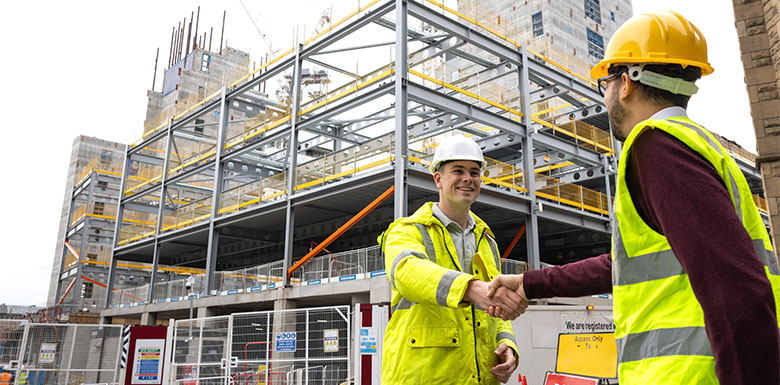How to become a builder
 In this article
In this article
One of the most sought-after trades in the UK, builders and construction workers operate in an industry where regular work is always ongoing, and those with years of experience or operating their own businesses can earn a substantial salary compared to more niche trades.
However, while experienced builders and high-quality construction work are always in demand, there’s a lot of training that goes into becoming a builder. From the basics of construction work itself to knowing how to safely deal with hazards on a building site, earning your qualifications can be a lengthy process.
But if you enjoy working with your hands and you’re eager to find a rewarding lifetime career, then becoming a builder may be the right choice for you. Keep reading to learn more about what builders do on a daily basis, and the different types of qualifications you’ll need in order to become certified.
Why might you consider becoming a builder or construction worker?
As with other well-known trade jobs, such as electricians and decorators, builders fill an essential role within the wider trades industry – one that’s never going to go away. Indeed, the construction industry is only growing, and many firms need constant new staff to meet project demands.
This reason alone makes learning how to become a construction worker or builder an appealing career choice for anyone who wants to get started in the trades, not to mention the fact that experienced builders are some of the best paid tradespeople in the UK.
Alongside this, it’s not uncommon for those in the building industry to consider starting a construction company after just a few years on the job. Becoming a builder is a fantastic way to start your own self-employment journey if that’s something you’re interested in trying down the line.
What does a builder do?
The main role of a builder is to construct a variety of structures in both the commercial and residential sectors. However, the building work itself is often broken down into different jobs.
Here’s a quick look at what a trained builder might get up to on any given workday:
- Bricklaying
- Plastering
- Insulation installation
- Soundproofing
- Plasterboard construction
- General repair and renovation work
- Erecting and dismantling scaffolding
On top of these, a builder with several years’ experience under their belt might then become involved in the following areas:
- Communicating and coordinating with other essential tradespeople to complete a project
- Conducting safety audits of your construction sites
- Supervising building work and managing a team
- Training junior employees and apprentices
Far from being funnelled down towards one activity, building work is both varied and engaging, and many skilled builders eventually look to specialise in specific aspects of building work that they find the most enjoyable.
What qualifications do you need to be a builder in the UK?
In order to become a successful builder in the UK, you’ll need to earn the relevant qualifications in the field so that you can seek employment and promote yourself as a reputable tradesperson.
One way to do this is through an apprenticeship scheme. Here, you’ll learn the ins and outs of the physical and practical side of the job, as well as essential health and safety training you’ll need to be aware of, all while earning an income to support your learning.
However, if you don’t want to start with an apprenticeship straight away, then you should consider gaining one or more of the following college qualifications:
- NVQ Level 1 Certificate in Construction Skills
- NVQ Level 2 Certificate in Construction Operations
- T Level in On-site Construction
Finally, once you’ve qualified as a builder and have some level of direct work experience, you should explore seeking accreditation with the Federation of Master Builders. Earning this distinction will help you to stand out as a reputable builder with potential customers, one who can be trusted to deliver exceptional work on each project.
Getting CSCS certified
Alongside getting qualified as a builder, you should also look to get CSCS certified. A CSCS certification and card are a legal requirement for anyone working on a construction site, and without one, you will be very limited in the work you can take on
How long does it take to become a builder?
Although many initial builder courses can be completed in several weeks or months, you likely won’t be fully qualified as a builder until at least a year or more of working in the industry. However, once you’re fully qualified, you’ll have a useful skillset that will serve you well for life.
What other skills do I need to become a builder?
Besides gaining your initial training credentials, all builders can benefit from having experience in the following areas:
- Attention to detail – building work requires precision and an eye for accuracy in order to complete projects to a high standard, so having good attention to detail is always a plus.
- Communication skills – as a builder, you’ll be required to work with other tradespeople and customers on any given day, so having good communication skills is essential.
- Good physical fitness – building work is a physically demanding job, and you’ll find carrying out your day-to-day work that much more manageable if you maintain a good level of physical fitness.
- Teamwork skills – all builders work as part of a team, so, naturally, developing your teamwork skills will only improve your hiring potential.
- Technical understanding – knowing how to correctly read and interpret blueprints and plans is often required for building work to be completed correctly, so familiarising yourself with technical specifications in this field is a good move.
- Understanding of safety – like many trades, building work can be dangerous if you’re not careful, so make sure you have a good understanding of building regulations and safe working protocols before seeking employment.
How much do builders and construction workers earn?
Those in the building trade can earn anything from £18,000 when just starting out to £43,000+ a year if they’re experienced or run their own business. Just bear in mind that location will play a role in how much you can earn, with those in London and bigger cities earning more in general compared to more local and rural businesses.
Enhance your reputation as a Which? Trusted Trader
If you plan to start your own trades business in the future, then consider becoming a Which? Trusted Trader.
As a Trusted Trader, you’ll get your own business profile to display customer reviews and examples of your work, and a dedicated account manager to help set it up. Not only that, but having the Which? stamp of approval is a clear sign that you’re a good tradesperson to work with.
Become a Trusted Trader
When customers see you displaying our logo, they'll know you're a trader they can trust
Find out more




